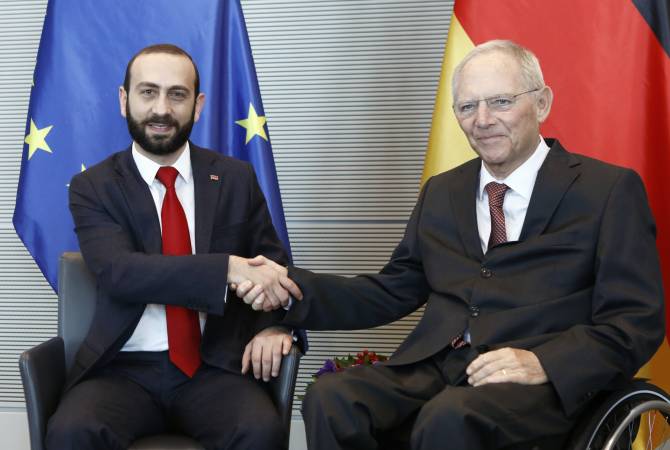Armenian-German Relations Move Forward: Mirzoyan in Berlin
Apr/02/2019 Archived in:Armenia | International

Parliament President Ararat Mirzoyan, left, with President of the Bundestag (Parliament) Wolfgang Schäuble
by Muriel Mirak-Weissbach
BERLIN, MARCH 28, 2019 — Following Prime Minister Nikol Pashinyan’s recent state visit to Germany, the process of intensifying contacts between Yerevan and Berlin continues apace. On the invitation of German Federal President Frank-Walter Steinmeier, the President of the Armenian Parliament Ararat Mirzoyan began a five-day visit to Germany on March 17. In the capital he was received by the President of the Bundestag (Parliament) Wolfgang Schäuble, and was scheduled to meet with parliamentarians, including Petra Pau, Bundestag Vice-President, and Johannes Kars, head of the German-South Caucasus Friendship Group.
His agenda includes discussions with Ralf Wieland, President of the Berlin parliament, Stephan Toscani, President of the Saarland federal state parliament and Parliamentarian Albert Weiler, President of the German-Armenian Forum. The delegation, comprising parliamentarians Ruben Rubinyan, Lilit Makunts, Ednon Marukyan, Naira Zohrabyan and Tsovinar Vardanyan, was invited to visit the German Parliamentary Association (DPG) the German Institute for International and Security Affairs (SWP) and the Saarland University.
Two Peaceful Revolutions
In remarks on March 18 in the Berlin Parliament, Mirzoyan recalled the image still fresh in many Germans’ memories of “the Berlin Wall dividing the people, the country and your beloved city from each other.” He went on to evoke the events of November 9, 1989 when “the people of Germany united” around the idea of an undivided nation, which led to the collapse of the regime in East Germany, and “resulted in the re-unification of Germany on October 3, 1990, which opened a new page in the world history. The world is glad to see again a united and dynamic Germany.” He referred to a picture in the ‘Berlin Wall’ Museum, which shows a woman leaning against the wall, with the caption, “The pressure that in 1987 I made with the palm of my hand produced its result after two years.”
Turning to his own experience, Mirzoyan said, “The struggle of the citizens of the Republic of Armenia through many years for democracy in our country, protection of human rights and the rule of law resulted in the Velvet, non-violent Revolution in April-May, 2018, which unfolded completely in accordance with the Constitution. Now,” he continued, “we should strengthen the democratic model of development and develop its efficiency. In this respect we consider important the deepening of our relations with the EU.”
Working with Europe
“We are resolute to expand and deepen the process of institutional reforms together with our European colleagues. We also highly evaluate the balanced policy being pursued by Germany in the South Caucasus and the support to Armenia in different spheres.” The high-level political dialogue established between Germany and Armenia, characterized by “inter-parliamentary cooperation, the expanding cooperation in bilateral and multilateral formats, and the activation of economic and cultural ties serve as evidence of further deepening of cooperation.” Mirzoyan said that in the process of enhancing relations, he thought the capital cities in the two countries could play a special role. “I hope that Berlin and our 2800-year old capital Yerevan will be able to carry out joint cooperation programs for learning from each other and exchange of experience. The experience of Berlin will certainly be useful for the newly elected authorities of Yerevan in the context of urban management and sustainable development of the city economy.”
In his meeting with the leadership of the German-Armenian Forum, Mirzoyan reiterated that it is Armenia’s intention to seek an even more intensive dialogue with Germany, in which the Forum could play a vital role. Forum President Albert Weiler reported on the aims and activities of the relatively young association. The Forum and its members have followed the political upheavals in Armenia with attention, he said, and welcome the reforms that the new government has announced.
Cooperation with Armenia should be stimulated by the EU-Armenia Partnership Agreement, he said, adding that the Bundestag would vote on the document in April. “With the Partnership Agreement Armenia has a comprehensive and excellent opportunity to develop cooperation with the EU and to carry out reforms in various fields. Our aim,” Weiler continued, “is to intensify the political and economic partnership and cooperation with Armenia on the basis of our common values and close ties,” and this, he added, includes strengthening participation in European Union policies, programs and agencies.
At the conclusion of the meeting, Mirzoyan responded to questions by Forum members. At the event several high-ranking representatives of the city were present, as well as the Primate of the Armenian Church in Germany, Archimandrite Isakhanyan, and the Provost of St. Hedwigs Cathedral, Tobias Przytarski. Forum President Weiler joined Parliament President Mirzoyan in laying a wreath on the memorial stone commemorating the victims of the Armenian genocide.
(Sources: Armenpress, German wires, German-Armenian Forum press release; Mirzoyan speech adapted from “Armedia” Information, Analytical Agency)

